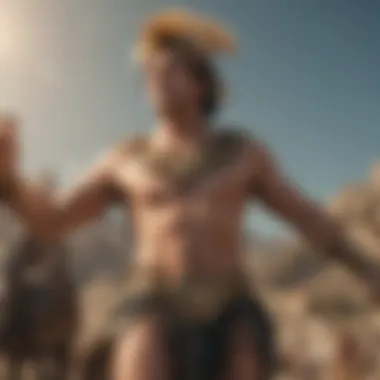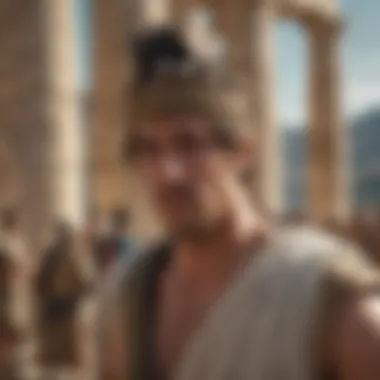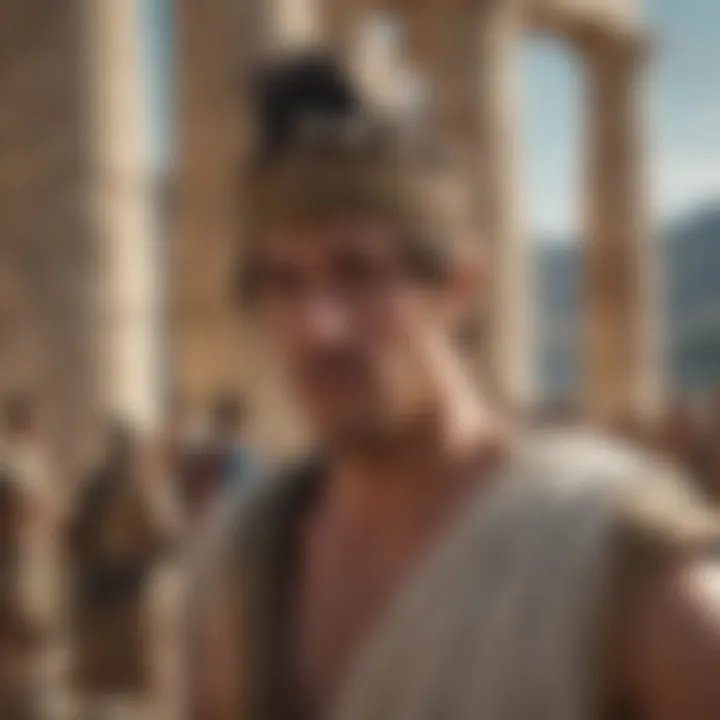Exploring Mythos: Fry's Insightful Take on Greek Myths


Intro
Stephen Fry's Mythos presents a distinctive lens through which ancient Greek mythology is retold. This book finds its place in a literary landscape already rich with mythological narratives. However, Fry’s approach stands out due to his adept blend of humor, insight, and meticulous research. This article aims to explore Fry's interpretations, emphasizing how they resonate with modern sensibilities and cultural contexts.
Artist Profile
Biography and Background
Stephen Fry was born in 1957 in Hampstead, London. His career spans various domains, including acting, writing, and broadcasting. Fry's intellectual pursuits mirror his diverse talents, and his fascination with mythology can be traced back to his formative years. He has long been an advocate for the arts and education, which informs his capacity to communicate complex themes in accessible language. Mythos serves as a culmination of his passion for storytelling and ancient tales, providing audiences with an engaging retrospective on these timeless myths.
Major Influences and Inspirations
Fry's inspirations are multifaceted. He draws from literary greats who have tackled mythology, such as Robert Graves and Joseph Campbell. Academic interest coupled with personal anecdotes allows Fry to weave his narratives with a compelling mix of scholarship and anecdotal experience. This unique perspective fosters a profound connection with readers who seek greater understanding of Greek mythology.
Themes and Cultural Relevance
Fry's Mythos delves into key themes such as fate, power, and the role of the gods in human life. He underscores the interplay between human vulnerability and divine influences. The exploration of these elements invites contemporary readers to reconsider their positions within a larger narrative framework. Moreover, Fry highlights how ancient myths can resonate with modern dilemmas, demonstrating their ongoing relevance in addressing themes like jealousy, ambition, and love.
The cultural context within which Fry writes is significant. He captures the ongoing conversation about mythology's relevance in today's world. As people grapple with identity and belonging, Fry illuminates how the stories of Persephone, Odysseus, and other figures mirror current existential quests. Thus, his narratives serve not merely as retellings but as reflections that encourage readers to engage with their own stories.
Character Interpretations
Fry approaches Greek figures with a nuanced lens. For instance, his interpretation of Prometheus brings out layers of defiance and empathy that may be overlooked in traditional narratives. He meticulously paints each character, ensuring that they are not merely symbols but relatable entities embodying aspects of human nature. Fry’s rendition fosters empathy, urging readers to reflect on humanity through the lens of mythological personas.
In contrast, figures like Zeus are depicted with moral ambiguity, prompting discussions on power and authority. Fry does not shy away from portraying the less flattering traits of these gods, thereby enriching the discourse surrounding them.
Culmination
Through Mythos, Stephen Fry reintroduces the complexities of Greek mythology to today's readers. By emphasizing the cultural relevance and emotional depth of mythological tales, he invites contemplation on how these narratives continue to shape modern thought. This analysis serves to synthesize the insights gleaned from Fry’s work, making it a valuable resource for those striving to deepen their understanding of ancient mythology while drawing parallels to contemporary issues.
Preamble to Mythos
The analysis of Stephen Fry's Mythos offers significant insights into the nuances of Greek mythology. This work stands out not only for its vivid storytelling but also for its philosophical implications. Fry's unique interpretation serves to bridge the gap between ancient narratives and modern sensibilities. Understanding this text is vital because it provides a fresh lens through which to view myths that have shaped cultural narratives for centuries.
Within Mythos, Fry reinvents familiar tales, making them accessible to contemporary audiences. He goes beyond mere retelling; he imbues each story with personal anecdotes and observations, elevating the myths into a form that resonates with today's readers. This approach encourages a deeper interest in the original stories and their meanings, presenting them as relevant rather than archaic.
Moreover, Fry's Mythos provides a platform for engaging with broader themes such as morality, the human condition, and the interplay of fate and free will. Recognizing these themes enhances the reader's appreciation for the depth of the characters and their journeys, cultivating a rich dialogue about life and ethics. By examining Fry's retelling, readers can engage with the transformative power of mythology, seeing it not just as entertainment but as a source of wisdom and reflection.
Overview of the Book
In Mythos, Stephen Fry presents the tales of Greek gods and heroes in a fresh and engaging manner. The book serves as a modern retelling, making the engrossing world of Greek mythology approachable. Fry's narrative is filled with humor and insight, allowing readers to connect with the stories on various levels. The structure of the book is designed to guide readers through complex narratives while maintaining clarity. With chapters focused on specific myths, Fry provides both context and analysis, enriching the reader's understanding of each character and event.
Fry employs a narrative style characterized by wit and an informal tone, drawing readers into the mythological world with ease. His well-researched background informs his storytelling, as he intersperses historical details with engaging commentary. This method encourages a deeper exploration of Greek mythology, making it relevant to modern audiences. The beauty of Mythos lies in its ability to resurrect ancient tales and reveal their underlying messages anew.
Stephen Fry: Background and Influence
Stephen Fry, acclaimed author, actor, and presenter, brings a unique perspective to the interpretation of Greek mythology. His background in literature and his experience in various artistic fields contribute to the depth of his storytelling. Fry has a knack for absorbing complex ideas and presenting them in a relatable fashion. This talent ensures that his interpretations resonate with a wide audience.
Fry's influence in media and literature helps shape the narrative of Greek mythology for a modern audience. He possesses not just knowledge but a genuine passion for these ancient tales. Fry's ability to connect personal experiences to mythological themes creates a sense of familiarity, inviting readers to reflect on their own lives in relation to these stories. His work stands as a testament to the relevance of mythology, showing that these ancient tales still hold significance in contemporary culture. Through Fry's lens, the narratives gain renewed vitality, sparking curiosity and reflection among readers.
The Structure of Mythos


Understanding the structure of Stephen Fry's Mythos is crucial for grasping how he reinvents ancient narratives for a modern audience. Fry's organizational choices influence the reader's engagement and comprehension. The way he breaks down the myths reflects not only artistic intent but also an educational strategy designed to clarify complex themes and characters.
Narrative Techniques Used
Fry employs various narrative techniques to breathe new life into Greek mythology. His use of first-person narration creates an intimate atmosphere. This approach allows readers to feel as if they are sharing in Fry's journey of discovery as he recounts these timeless stories. The conversational tone is a standout feature; it removes the barrier between the ancient past and contemporary readers.
Fry also integrates humor and anecdotes, making the text relatable. Although the subject matter is sometimes dark, his lighter touches keep the reader engaged. Moreover, Fry uses flashbacks to enrich character development. By presenting background information at strategic moments, he offers layers to the narrative that would be absent in traditional retellings.
"Stephen Fry's Mythos is not merely a retelling; it is an invitation to explore the intricacies of human emotion and motivation found within these ancient tales."
In terms of pacing, Fry balances exposition with action, allowing the reader to absorb essential background information without feeling overwhelmed. Each character's entry is usually paired with significant themes, tying their personal journeys to larger mythological frameworks.
Chapter Breakdown and Themes
The chapter breakdown in Mythos reveals how Fry categorizes stories into accessible sections. Each chapter typically focuses on a particular myth or character and explores its themes in relation to the overall narrative arc of Greek mythology.
For instance, introductory chapters set the stage for foundational stories such as the creation myth, diving into themes of chaos vs. order. Subsequent chapters examine individual figures—taking myths like those of Zeus, Hera, and Prometheus—to reveal deeper insights about power dynamics and human virtues.
Key themes often intersect across chapters. The evolution of fate and free will is deeply explored, particularly in how characters navigate their destinies. Additionally, Fry's treatment of heroism presents a nuanced view, illustrating that heroes are flawed and driven by various motives, enhancing moral complexity.
In summary, the structure of Fry's Mythos is not only worth analyzing; it is central to understanding how ancient myths remain relevant today. By dissecting narrative techniques and examining thematic breakdowns, readers can appreciate the intricacies of Fry's interpretations and the stories that shaped cultures.
Major Themes in Fry's Retelling
Stephen Fry's retelling of Greek mythology in Mythos is rich with significant themes that reflect both ancient values and contemporary relevance. These themes serve as the backbone of his narrative, guiding the reader through complex moral landscapes and existential questions. Understanding these themes is essential for grasping the depths of Fry's interpretations and their implications for modern society.
Fry does not merely recount stories; he uses these myths to explore two fundamental human concerns: fate and free will, heroism and moral complexity, and the role of women in mythology. Each theme provides insight not only into the characters and their motivations but also into how these tales resonate in today's world. Fry's ability to intertwine these themes reinforces the timeless nature of Greek mythology and its capacity to adapt to shifting cultural contexts.
Fate and Free Will
In Fry's retelling, fate and free will emerge as pivotal concepts shaping the trajectories of the characters. The ancient Greeks believed that the gods often intervened in human affairs, dictating outcomes that had little to do with personal choice. Fry highlights this through numerous narratives where characters grapple with their destinies. He portrays the gods as powerful yet capricious figures who manipulate mortals to fulfill their own agendas.
This dichotomy raises profound questions about the extent of human agency. For instance, in the story of Oedipus, the protagonist's attempts to escape his foretold fate lead him directly into its fulfillment. Here, Fry effectively demonstrates the tragic irony that pervades Greek myths, illustrating how characters, despite their best efforts, often remain trapped in a web of divine manipulation.
This exploration encourages readers to reflect on their own lives. Are we truly in control of our choices, or are we subject to forces beyond our comprehension? Fry invites the audience to engage with these inquiries, prompting a deeper examination of personal responsibility and the nature of destiny in a world where unpredictability reigns.
Heroism and Moral Complexity
Fry’s examination of heroism and moral complexity presents a nuanced view of what it means to be a hero. Traditional narratives often depict heroes as paragons of virtue, but in Mythos, Fry deconstructs this notion by revealing their flaws and ethical dilemmas. Characters like Achilles and Odysseus are celebrated for their bravery yet are deeply flawed, driven by pride, revenge, and questionable motives.
Fry portrays Achilles’ rage and its consequences, illustrating how heroes often make decisions that lead to devastation. This complexity paints a more realistic picture of heroism, one that includes internal conflicts and moral ambiguity.
By offering a more nuanced portrayal, Fry challenges the modern audience to rethink their perceptions of heroism. He suggests that true courage may not lie solely in grand deeds but in the willingness to confront one's own shortcomings and the often harsh realities of human existence.
The Role of Women in Mythology
In Mythos, Fry's treatment of the role of women in mythology is both insightful and critical. Women in Greek myths often occupy diminished or passive roles, serving primarily as rewards, objects of desire, or sources of conflict. However, Fry highlights several powerful female figures, such as Athena and Hera, revealing their influence and complexity.
Beyond merely acknowledging these figures, Fry examines their motivations and actions. He presents their narratives not as ancillary to male heroes but as pivotal to the unfolding of myths. Athena, with her wisdom and strategic prowess, emerges as a force to be reckoned with, stealing the limelight in various tales.
This critical lens invites readers to reconsider the portrayals of women across cultures. It asks, How can we reframe our understanding of female agency within these ancient narratives? By doing so, Fry underscores the importance of recognizing women's contributions to mythology, encouraging a more balanced understanding of these enduring tales.
In summary, Fry’s revisitation of Greek mythology adds layers of meaning through these themes. He invites serious contemplation on fate, heroism, and gender dynamics, offering a fresh perspective for both literature enthusiasts and casual readers alike. Each section of Mythos functions not just as a retelling but as a catalyst for deeper dialogue surrounding the human experience.


Characterization in Mythos
Characterization plays a critical role in Stephen Fry's retelling of Greek myths in Mythos. It shapes the narrative and provides depth to the age-old stories, allowing readers to form connections with the characters. Fry’s approach to characterization brings to life figures like Zeus, Hera, and Prometheus, making them relatable and nuanced. Through vivid portrayals and detailed arcs, Fry explores the motivations and struggles of these characters, illustrating their significance in mythological tales.
The humanization of these characters serves many purposes. First, it invites readers to engage with complex themes such as fate, free will, and morality on a personal level. Second, Fry's characterization enhances the educational aspect by providing insights into human nature as depicted in mythology. This not only helps in understanding ancient cultures but also showcases their relevance today.
Moreover, Fry's vivid characterizations often challenge traditional views of these mythical figures. By doing this, he presents an evolving narrative where the heroes and villains are not so clearly defined. The significance of this nuanced approach cannot be overstated; it allows readers to appreciate the intricacies of the myths while reflecting on their own moral compass.
Key Figures and Their Arcs
Fry's retelling prominently features several key figures whose arcs are central to understanding the mythology. For example, characters such as Prometheus embody the theme of defiance against authority. Fry illustrates Prometheus's journey, from his act of stealing fire for humanity to his ensuing punishment by Zeus. This arc raises questions about sacrifice and the consequences of rebellion.
Similarly, Persephone's dual existence as both the queen of the underworld and a daughter of Demeter adds layers to her character. Fry captures her transformation over time, highlighting her agency amidst the circumstances dictated by other gods. These arcs underscore the struggles between power, choice, and identity, making the characters feel alive and fraught with challenges.
Fry's Unique Interpretations
What sets Fry's interpretations apart is his ability to blend familiar stories with contemporary sensibilities. Unlike many traditional tellings, Fry often infuses humor and wit into the characterization, offering an accessible approach to complex narratives and moments. This method does not detract from the seriousness of the myths; rather, it creates a bridge between ancient tales and modern readers.
One of the hallmarks of Fry's technique is his focus on the emotional depth of characters. His retelling of Medusa, for example, dives into themes of victimization and transformation rather than painting her simply as a monster. By recognizing the circumstances that led to her curse, Fry invites empathy and understanding from the audience.
Ultimately, the unique characterizations in Mythos enable Fry to present an intricate tapestry of human experiences that resonate across time, enriching the reader’s appreciation of ancient mythology. The application of modern perspectives to these traditional figures encourages dialogues about human behavior, morality, and societal values, maintaining the timeless nature of these myths.
"Fry's portrayal of these characters is not merely a retelling, but an invitation to understand the complexities of the human condition through the lens of mythology."
Thus, the careful crafting of characters within Fry's Mythos is not simply a literary device; it is an essential element that connects past narratives with present lives, offering a continuum of wisdom and reflection.
Cultural Context of Greek Myths
Understanding the cultural context of Greek myths is crucial for grasping Stephen Fry's interpretation in Mythos. Myths are not merely stories; they are reflections of the societies that tell them. Greek mythology discusses fundamental human experiences and social issues. By placing myths within their historical and cultural framework, Fry is able to clarify their continued relevance today.
Historical Significance of Myths
Greek myths have played a key role in laying the philosophical foundations of Western civilization. These narratives illustrate ancient Greek values like justice, courage, and the importance of community.
- Religion and Worship: Myths were originally used as a means of understanding the divine. They informed religious beliefs and rituals, providing explanations for natural phenomena and life events.
- Moral Lessons: Many myths serve as cautionary tales. Characters face dire consequences based on their choices, offering insights into human behavior.
- Cultural Identity: Myths shaped the identity of the Greek people. They provided a shared set of stories that fostered unity among diverse city-states.
Fry's retelling brings these elements to light, making them accessible to a modern audience who may otherwise overlook their significance.
Influence of Mythology on Western Culture
The influence of Greek mythology permeates various aspects of Western culture, from literature to art and psychology. Fry’s Mythos highlights these connections effectively.
- Literature: Writers such as Homer and Sophocles have set the precedent for narrative storytelling. Characters and themes from Greek myths often reappear in modern literature, showcasing their impact across millennia.
- Visual Arts: Artists like Michelangelo and Botticelli drew upon Greek myths to inspire their work. The aesthetics and symbolism found in these stories are embedded in their creations.
- Psychology: Psychoanalysts like Sigmund Freud and Carl Jung used mythological concepts to explain human behavior and psyche. Their theories often reference myth to showcase universal themes of growth and conflict.
Understanding these influences helps readers appreciate the lasting power of the myths that Fry retells.
"Fry's work bridges the ancient and modern worlds, reminding us of the tales that shape our cultures and identities."
The cultural context provides a backdrop for the characters and themes explored in Mythos. Fry does not just recount stories; he evokes a dialogue between past and present, highlighting the significance of myths in understanding human nature.
Comparative Analysis with Other Renderings
In the realm of literature, especially concerning mythology, comparative analysis plays a crucial role in understanding various interpretations of timeless stories. This section seeks to explore how Stephen Fry's Mythos stacks up not only against traditional Greek texts but also modern adaptations. By doing so, we can see the nuances in Fry's retellings and their significance in the context of both historical and contemporary frameworks. Such analysis sheds light on how mythology evolves and remains relevant.


Mythos vs. Traditional Greek Texts
Stephen Fry's Mythos serves as a refreshing retelling of Greek mythology, providing a distinct voice against the backdrop of ancient texts. Traditional sources, such as Homer's Iliad and Odyssey or Hesiod's Theogony, establish the backbone of these myths, focusing on epic storytelling and profound theological inquiries. Fry, however, takes a different approach.
- Accessibility: Fry simplifies complex narratives. He breaks down intricate details. This makes the story more engaging for modern readers.
- Character Depth: In traditional texts, gods and heroes can appear distant. They might lack emotional nuance. Fry gives characters relatable traits, allowing readers to connect on a personal level.
- Narrative Style: Fry employs a conversational tone. This brings the myths to life. It contrasts with the often lofty and grandiose language of ancient epics.
- Cultural Relevance: Fry draws parallels between ancient beliefs and contemporary society. He makes the stories applicable to modern life, emphasizing their enduring relevance.
Fry's version does not replace these traditional readings but rather complements them. His work encourages readers to revisit the originals with fresh eyes, deepening their understanding of ancient narratives and their implications.
Modern Interpretations of Greek Myths
The landscape of Greek mythology has experienced significant reinterpretation in recent years. Scholars, artists, and writers have reframed these ancient tales to reflect modern issues. Fry's Mythos stands out among these modern interpretations for several reasons:
- Diversity of Voices: Contemporary retellings often feature a wider array of perspectives. Fry's work includes insights from various cultural contexts, making the mythology more inclusive.
- Intersection with Popular Culture: Many modern adaptations draw connections to movies, television, and other media. Fry's references often connect myths to current cultural phenomena, which further engages readers.
- Thematic Exploration: Modern interpretations often focus on themes such as gender equality and colonialism. Fry also addresses these issues in Mythos, evaluating gender roles while retaining the essence of the original stories.
- Reimagining Characters: Many modern authors rewrite traditional roles historically assigned to gods and heroes. This reimagining can change how readers perceive well-known figures. Fry’s approach, while honoring the past, provides clarity and resonates with contemporary audiences.
By analyzing Fry's work alongside both traditional texts and modern interpretations, readers can discern how mythology is recontextualized. It reflects not just the stories themselves, but the societies that tell them. This ongoing dialogue preserves these myths while allowing them to adapt and thrive.
Reception and Impact of Mythos
The reception of Stephen Fry's Mythos has played a crucial role in understanding its impact on both literary circles and popular culture. Fry’s ability to reintroduce ancient myths to a contemporary audience raises several points of discussion. His work acts not only as a retelling but also as a bridge between past narratives and present-day interpretations. This section delves into how critics and readers alike perceive the work, and the broader implications it has had in modern storytelling.
Critical Reviews and Audience Reception
Fry's Mythos received positive acclaim from various critics and audiences. Reviewers have often noted the witty prose and accessibility of the content. This approach lends itself to a wider readership, moving beyond academia and inviting casual readers. Critics have pointed out that Fry manages to capture the essence of Greek myths while integrating humor and insight. This balance allows readers to engage with the material without feeling overwhelmed by its complexity.
Many find that Fry’s voice feels current, a refreshing contrast to more traditional interpretations of Greek mythology. His storytelling engages readers, drawing them into a world where ancient tales resonate in modern contexts. Notably, outlets such as Britannica highlight his effectiveness in rejuvenating interest in these stories. The reviews often mention that through Fry's retelling, readers are encouraged to rethink their understanding of myth and its relevance in contemporary issues.
"Fry’s ability to interlace humor with profound insights cuts through the typically overwhelming academic discourse on mythology, creating a connection with his audience."
This comment reflects the sentiments of many reviews emphasizing Fry's skillful juggling of these elements.
Influence on Popular Culture
The impact of Mythos pushes beyond the confines of literature and into popular culture. Fry's interpretations have sparked renewed interest in not only Greek mythology but also in mythological retellings in various media. His narrative style encourages filmmakers, writers, and artists to explore these themes and characters in new contexts.
Some notable influences include:
- Film Adaptations: Movies and television shows often revisit these ancient stories. Fry's work has inspired creatives to draw from the emotional and moral complexities he highlights.
- Graphic Novels: The rise of retellings in graphic form showcases a blend of modern artistry with ancient themes.
- Social Media: Platforms like Facebook and Reddit have increased conversations about mythology, influenced by Fry's engaging approaches and relatable examples.
Fry's Mythos shatters the notion that mythology is a static collection of stories. By presenting these tales in a contemporary light, he invites ongoing dialogues and interpretations. Through Mythos, readers not only engage with the stories but reflect on their implications in understanding human nature and society.
The convergence of Fry’s work with various forms of art ensures that these ancient narratives maintain relevance in today’s world. Mythos stands as a pivotal work that showcases how retellings can shape our perceptions and keep folklore alive.
Finale
The conclusion serves as a pivotal element in understanding Stephen Fry’s retelling of Greek mythology through Mythos. It synthesizes discussions on themes, cultural context, and character explorations, reinforcing the text's significance in contemporary storytelling. Fry's approach not only sheds light on the complexities of ancient narratives but also engages a modern audience that craves relevance in historical tales. The connection he forges between past and present allows readers to appreciate the enduring legacy of myths.
Reflection on Fry’s Contribution to Mythology
Stephen Fry's contribution to mythology is profound. He successfully demystifies complex Greek myths, presenting them in a manner that is accessible yet intellectually stimulating. His narrative techniques engage readers, inviting them into the world of gods, heroes, and intricate moral dilemmas. By weaving personal insights with traditional tales, Fry adds a layer of relatability to characters often viewed as distant figures in ancient literature. His interpretation allows readers to reflect on timeless themes such as love, betrayal, and the quest for identity.
Fry's narratives also challenge readers to reconsider the role of these myths in modern society. In a world increasingly marked by complexity, Fry's interpretations resonate deeply, offering not just stories, but also ethical considerations and cultural critiques. This duality enhances the educational value of Mythos, making it a significant contribution to both literary and mythological scholarship.
The Future of Mythological Narratives
As we move forward, the future of mythological narratives seems bright yet challenging. In an age of rapid technological advancement and shifting cultural landscapes, stories from ancient times continue to evolve. Fry's Mythos exemplifies how classical themes can be reinterpreted to resonate with contemporary audiences.
As mythological narratives adapt, there is potential for new genres to emerge. For instance, podcasts, graphic novels, and interactive media may further democratize access to these stories. However, it is crucial to preserve the integrity of the source material.
Readers can expect that future retellings will engage with historical contexts while embracing innovations in storytelling. Moreover, there is an increasing interest in diversifying narrative voices, which will enrich the landscape of mythology. By integrating offshoots of cultural heritage, new interpretations can foster a broader understanding of mythological significance across different societies.







